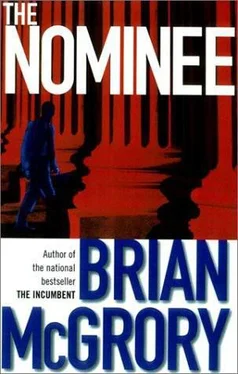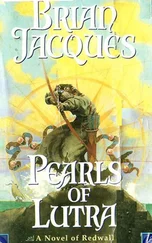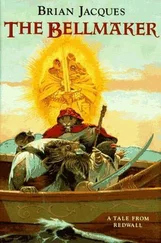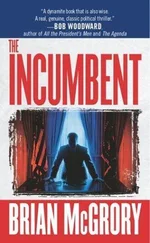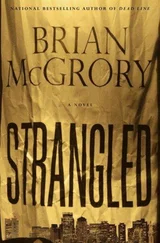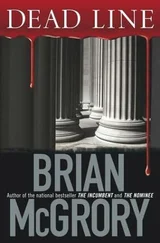He missed.
Think about that for a moment. Think about Vinny Mongillo, his sheer size, his proximity to the weapon, his straight path at the man at the end of it. And Lance Randolph missed. Granted, you don’t have to take a shooting test to be the lead law enforcement officer in the United States of America, but maybe you should, and if you did, this errant shot alone should disqualify him. Vinny kept coming, Randolph was about to fire again, but I regained my wits and gave him a roundhouse punch to the temple, bringing him quickly to the floor, the gun falling aimlessly, harmlessly on the Oriental rug. Mongillo pulled up short just before knocking my nose somewhere into the back of my neck. I swooped down, grabbed the pistol, and pointed it at Randolph’s head.
He lay on the ground, groaning and semiconscious, like a presidential candidate at the end of the New York primary. I handed Mongillo the gun, ran to the coffee table, and grabbed the tape player, which, much to my relief, was still recording. Somewhere, the gods of journalism shine down on me, even as they’re about to take my newspaper away. I went over to Fitzgerald’s desk to call 911, then hesitated with the receiver in my hand. If the wrong Boston cops arrived, all hell could break lose, or more accurately, all evidence could be contorted and concealed. I didn’t want to call the FBI, because they’re the ones that let Randolph out of their sights. Everybody’s got an angle, and none of them seemed to help my cause.
So I said to Mongillo, “Let’s put him in the closet.”
“Put him in the closet? You can’t just put him in the closet.”
“Why not?”
Mongillo stood over him, gun in hand, his shirt untucked from the fit of physical energy. He shrugged and replied, “I don’t know. Maybe we can.”
I needed some time. I needed some time to get over to the newsroom, write a story detailing what happened that night, including the salient facts of Fitzgerald’s lies and his firing, and get them in the Sunday paper.
Once the presses were rolling, let the cops come in. Let Commissioner Leavitt arm Randolph with an Uzi submachine gun and set him free, for all I care. Everything would work out fine, because there’s nothing better than enlightenment, no weapon better than public attention, a lesson I vividly recall learning from Fitzgerald so many years ago.
Speaking of whom, he saved my life, Robert Fitzgerald did, after almost causing me to lose it a couple of times before. He was sitting back on his rocking chair, holding his arm, watching the bedlam unfold with his jaundiced reporter’s eye.
I said to him, “Drop you off at the hospital, Robert?”
He shook his head. “No, Jack. You’re on deadline. I’ll take a cab over. I’ll be just fine.”
You’re on deadline. I love that answer. Once a newspaperman, always a newspaperman, even when you’ve strayed far across that sometimes smudged black line.
Mongillo picked up the governor, who was coming to, but not entirely there. I patted him down in search of more weapons, and found none. Mongillo placed him in Fitzgerald’s coat closet and I wedged a chair under the doorknob.
Fitzgerald walked out ahead of me. I told Mongillo, “Don’t move. I’ll call your cell when I’m done. I’m going to need about an hour.”
“What if he tries to escape?” Mongillo asked.
“Do what you always do,” I replied.
He gave me a curious expression, his big eyebrows raised on his giant forehead. I smiled and added, “Shoot from the hip.”
Two weeks later
SO I’M SITTING AT a bar in a small town outside of Springfield, Massachusetts, when the man on the next stool wearing a Nomar Garciaparra tee shirt turns to me and says, and I quote, “The press sucks.”
For originality, I’d give him a two, maybe a three, tops. For insight, something far higher.
“You know, I think you might be right,” I said.
“What do you do?”
“I’m a reporter.”
He took a big swallow of cold Budweiser and turned silently away to watch Evil Knievel’s youngest son try to jump twenty-three motor homes, I think Southwinds, on the television above the bar.
Not that I can blame him — my fleeting friend, not the younger Knievel. All around us was the living evidence of his intuitive assertion. The traveling media circus, bored of the ruthless governor and lying reporter in Boston, had packed up their camera gear, their light poles, their immense makeup cases, loaded them onto their satellite trucks and driven a couple of hours west to the latest story of national import.
And this one was a rager — Hollywood starlet returns to her childhood home to visit her estranged mother for the first time in ten years, and said mother ends up dead of an apparent asphyxiation. You had celebrity, mystery, small-town values rubbed raw by big city problems. Plus there was nothing else going on, anywhere. For God sake, get me rewrite.
Before all this, the circus had been in Washington covering Chandra Levy’s disappearance, and before that, Monica Lewinsky, and before that, Boulder, Colorado, on the killing of that little girl who was far too young to ever be a model, and before that, Los Angeles and the O.J. Simpson trial, all along just giving the public what they want, or what we think they want, or what they don’t know they want until they see it on TV or read it in print.
A guy came up to the bar. He had black-framed glasses on his under-sized head, a boy’s regular haircut, and three pens in his shirt pocket. He waved a twenty in the air and said in a nasally voice that made him sound like he was a year shy of high school, “Bartender, bartender.”
I turned to my bar mate who continued to ignore me and said, “A news producer, guaranteed.”
When the bartender came over, the producer’s cell phone rang and he picked it up and blathered incessantly, self-importantly, about satellite time and the night’s standup and the glorious fact that the victim’s sister broke down and cried in an impromptu interview.
Maybe Lance Randolph really was right. Maybe we are all vipers.
I ordered another beer and a bag of Chee-tos. The kid droned on into his phone. The bartender moved on to someone else. Another glamorous moment in the noble pursuit of news.
For the record, I made deadline that night two weeks ago. I made it by racing back to the paper in the delivery truck, bounding into the newsroom, and typing as fast as my lardy little fingers would carry my thoughts. Working with the body of the story that I had put together that afternoon, I wrote of Fitzgerald’s myriad indiscretions, his admissions, his forced resignation. I wrote how he blamed the wrong cop for bungling a drug raid five years before, and how he repeatedly gave Lance Randolph more credit than he ever deserved. I described the unfolding scene in Fitzgerald’s office with the governor and the handgun and the apparent reference to the shooting attempts of your faithful correspondent that occurred earlier in the week. Then I linked them all, artfully and carefully, to the murders of Paul Ellis and John Cutter that came before. And then, of course, I had an entirely separate story on the Cutter death and the evidence of murder that we found two days before.
When I finished, Justine Steele picked up a red telephone on the newsdesk. I’d never seen anyone so much as touch it before. I mean, the thing didn’t even have a keypad, like the damned Bat Phone or the Hot Line in the Oval Office that links Washington to Moscow.
“Stop the presses!” she said. She listened for a moment, then barked, “Yeah, I said, stop ’em!” She hung up with an enormous grin that belied the new, grim reality ofThe Boston Record. Then she told everyone around her, “I always wanted to say that.” This, ladies and gentlemen, is why she’s a great editor.
Читать дальше
